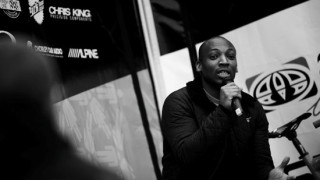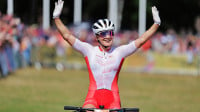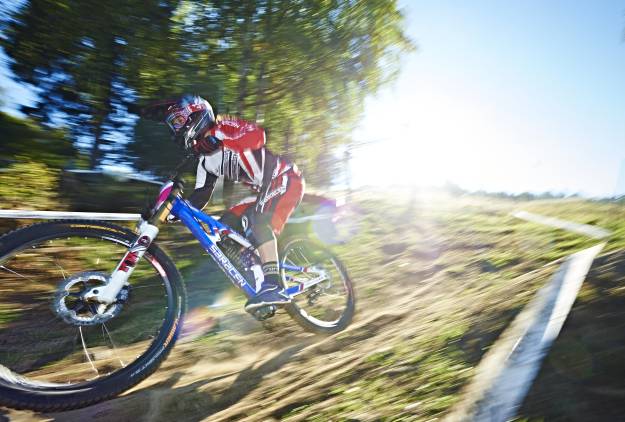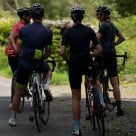![]() Follow britishcycling.org.uk on
Follow britishcycling.org.uk on ![]()
![]()
![]()
![]()
Preview: UCI Downhill/Fourcross World Cup
Maribor World Cup - Livecast and Report
Winter training is over. The bikes are fully prepped. The track is set. And today the game changes from physical to mental. We talk to the Atherton's performance coach and secret weapon - Jamie Edwards - for a very different preview of this weekend's UCI Mountain Bike World Cup downhill and fourcross.
The Atherton Project 2010 - Episode One
The opening round of the Downhill Mountain Bike World Cup and Maribor, Slovenia is set for a race which will begin to define the 2010 gravity season. Steve Peat, Sam Hill, the Atherton's, Tracy Moseley, Sabrina Jonnier, Greg Minnaar, Aaron Gwin - all the favourites are ready to take on the famous Pohorje mountainside - not forgetting round two of the fourcross competition where Jared Graves looks to continue his domination, while Anneke Beerten hopes to return from a frustrating crash in Houffalize.
But the race itself presents an interesting conundrum because on a well known course with riders nearing the physical limits of fitness, and bike technology matched across major manufacturers, increasingly the question is one of mental preparation; something that clearly manifested itself over recent years.
INSIDE THE MIND OF A PRO MOUNTAIN BIKER
In 2008 it was widely acknowledged that Sam Hill - the new king of downhill - cracked under external pressure of expectation to produce massive winning margins every time, while Steve Peat used the services of Sheffield Hallam University to take a different approach in 2009, finally clinching the illusive World Championship title after nearly two decades of trying.
What's clear, is that having the mental edge in mountain biking today is more important than ever before, which is why we caught up with Jamie Edwards, founder of Trained Brain, author of Mental Ketchup and Performance Coach to the Atherton Racing Team to give us an insight into what it takes mentally to stay at the top of the Mountain Bike World Cup.
UNCOVERING THE ATHERTON'S
The difference between being a great sportsperson and a great sporting champion - that's the actuality of embracing mental training. Surrounded by a room of personally signed international football, rugby and formula one memorabilia, there can be little doubt that Jamie Edwards' input on both the professional sporting and business scene is greatly valued. But what does it mean for the Atherton's and racing this weekend?
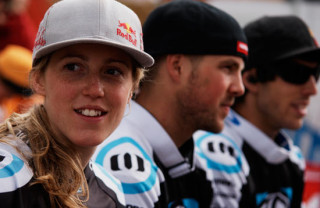
According to Edwards, there are three things every rider will take to Maribor; their beliefs, their expectations and their level of confidence.
"Beliefs are shaped on what has been achieved in the past, expectations are formed on how the winter of training has gone and their confidence is born out of the result of winter training and how they are looking forward to the coming season."
And with one week to pass until the race and no real physical gains to be made all attention turns to perfecting the before stage of the mental game - the first analysis coming from performance in previous years - something which has a tangible impact on perceived performance and most importantly, emotion as Edwards explains.
"What happened in previous years at this race can affect the mindset - but most importantly it is the way riders dealt with their feelings for Maribor in 2009 or 2008 directly after the race, which bears most importance.
"If you had a good Maribor last time, then the positive feeling will be there already. However a bad race or mistake will yield the opposite effect - much like a golfer has a bogey hole, riders can have their dreaded track. But that comes from the amount of emotion you put into your previous experience, and the expectation of a similar emotion the next time you are faced with the same situation."
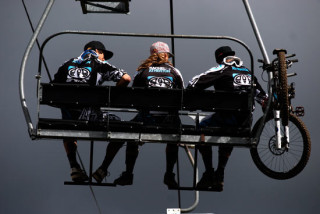
POWER IS NOTHING WITHOUT CONTROL
In order to control such emotions and prevent a series of doubts creeping into a riders mindset over a race weekend, two tools are employed to help the Atherton's focus on the race without becoming too negative, or worse still too positive.
According to Edwards positive thinking is a lie, because no matter how much positive thinking you exercise, it doesn't result in a great performance every time. By the same token if you go into negative thinking that is just as destructive - all of those negatives are no guarantee of poor performance either. The recommended approach is something called neutral thinking which is bound by the question: ‘what is possible?' Is it possible to have a good first World Cup? The answer is yes. It is always possible. And that is neutral thinking.

The second technique is constant assessment of what happens in racing and training. By processing performance and analysing four moments in time - known as the before, the during, the in-between and the after - each impact on neutral thinking can be dealt with.
Right now we're in the before stage, something which has effectively stretched for a period of years as Jamie has worked to develop the mental attributes of the Atherton's in the same way a coach would approach a training programme - something which Edwards details.
"I met the Atherton's through Red Bull; I had worked with both their athletes and on the corporate side prior to meeting them. At the time they wanted to be World Champions - an expectation they hadn't lived up to. They were great technically, great bodies, great athletes, but something was getting in the way. That moment was the first time they had looked at the way they were thinking."
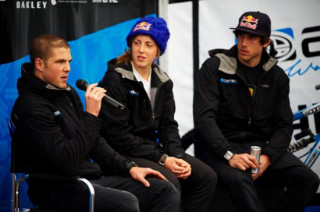
According to Edwards looking after the physical attributes where improvements are instantly measurable, while neglecting the mental counterparts, is a common theme in professional athletes - only to address the imbalance when something goes wrong.
"That's because when you mention the word psychologist there's a state of panic. They imagine the men in white coats, when all we're really talking about is taking making an improvement to mental approach rather than fixing something that is broken. Attaining such mental toughness is a process of development over a period of time, just like any other part of training. In fact, it should be part of the training plan - it is a real skill."
Edwards believes so much in the training of mental ability that his recommendation for a professional athlete would be to dedicate 30-40% of all training to improvement of thinking processes, something especially important in downhill and fourcross racing where the duration of the event is short, time gaps are less than seconds and mistakes are small but critical.
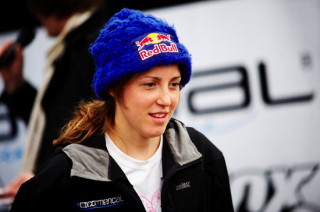
And while taking a third of all training time and allocating this to improving the mental approach may seem drastic, Edwards is often working with those who have attained the best possible physical and technical abilities, while ignoring the gains of neutral thinking and thought analysis, which can lead to even greater physical gains in the future.
"By developing the trained brain that you unlock your way of thinking, allowing you to train differently, race differently and ultimately to better apply yourself to life. I don't achieve this way of thinking by telling people what to do though, rather I get people thinking about things differently, which ultimately leads people to ask different questions and come up with different answers."
PERFECTING THE BEFORE
Exercising this skill at any time without assistance is essentially the zenith which Edward's aims to reach with all of his clients, expressing he can't be a constant crutch to lean on when anything goes wrong; instead the first step is to attain all mental skills before a challenging situation occurs; meeting the problem before it happens. And after last year and the surprise effect Rachel's absence had on the team, achieving that awareness is even higher on the priority list.
"I think the key difference in 2010 will be to have the whole family together; it will be huge. I don't think they realised, I don't think anyone truly realised how important Rachel was to the fabric of that team and the fabric of the family. You will feel a difference in the energy of the team this year. Everything is in place for that to happen; what you're looking for from a mental viewpoint is a consistency in personnel, and that's what the Atherton's have in a setup comparable to a formula 1 team.
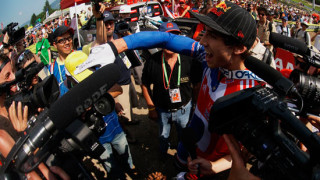
"Everyone has their role and everyone is in the flow, knowing exactly what they are doing. Dan Brown - team manager - is like the conductor; a vital role, but no more vital than the mechanics or the riders. What's more is to create the Atherton brand there has to be a media component as well. We live in a branding world and the Atherton's are no different. When you create a brand it also creates and expectation to go with it. If they want to be World Champions, they have a brand that befits that aspiration."
GEE, RACHEL, DAN
It becomes clear that perfecting the before and having a mental resilience will be crucial to take the win and the lead in the weekend's races and with the team together once more final preparations are underway for Maribor and creating the right mindset - something into which Jamie gives a unique insight .
"The Atherton's are three different personalities; sometimes I will sit down with all three of them, sometimes I will sit with them individually, because they are so different. Especially this year. For Gee it will be more about how he lets go of what happened last year. The mind wants to act as a reminder - it is easy to go back to that time and conclude last year equals this year. He will have to go into neutral thinking - this is of key importance.
"Rachel has a clean slate, so we'll be looking back into the past and tapping into her emotional bank account and looking at her positive feelings and her wins. But you have to be careful, because the mind can easily create doubt as to the possibility of living up to these past standards. Rachel has two pasts - one that will make her smile and another that won't. So the key is keeping Rachel in that place where she is accessing the positive memories of the past. What I work on with any athlete is the certainty of the self. When Rachel was at her best, she had certainty in herself. And that's what we have to get back to.
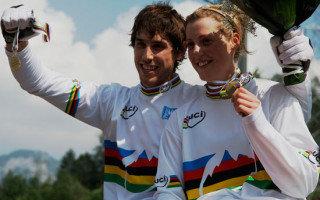
"Finally, for Dan this race will really signal the start of the season; being together with the family setup and having both races will motivate him more. Dan originally was a downhill rider - that's his passion. He will be looking forward to racing the downhill; there will be an expectancy there from Dan where he will be getting excited about competing in a downhill race. There will also be the fourcross, where he goes head-to-head against riders, so he gets the best of both parts of competition."
MAKING PREDICTIONS
The final question centres on the actual result of the weekend, but in keeping with the unconventional nature of this preview, Jamie won't offer anything - instead leaving it to the riders.
"The prediction is let's see what happens. When you predict, you forecast and when you forecast you create anxiety. So the prediction is let's see. You could predict it will be a fast track and it rains. Let's see what happens and we'll deal with it in the present moment. We can't get ahead of ourselves, until we are in the moment and the beeps go. Everything you can control, you try and control, anything you can't you let go of and you cross the line and you see if you're fast enough then."
In short, tune into the live coverage this weekend from Maribor. It's going to be intense!

